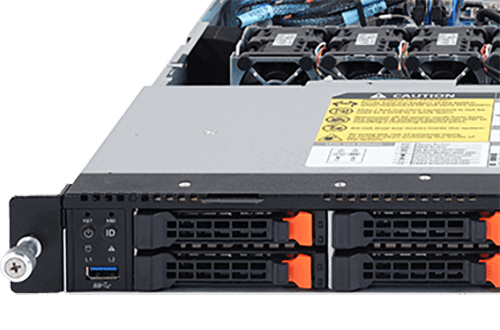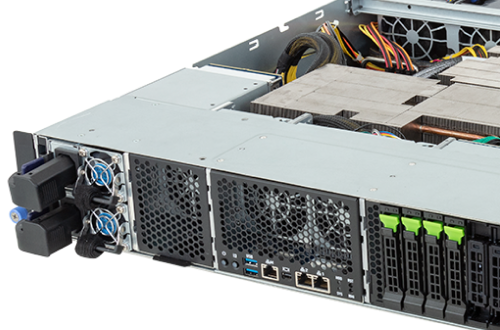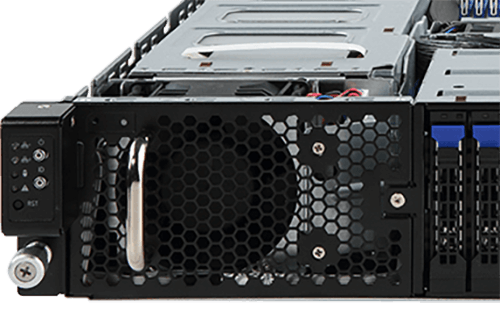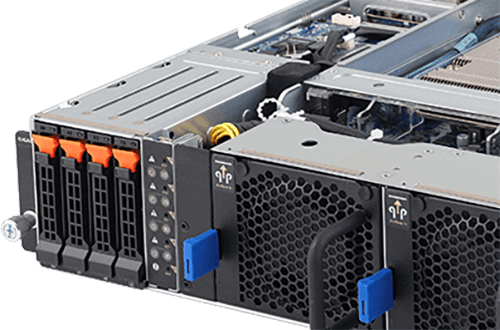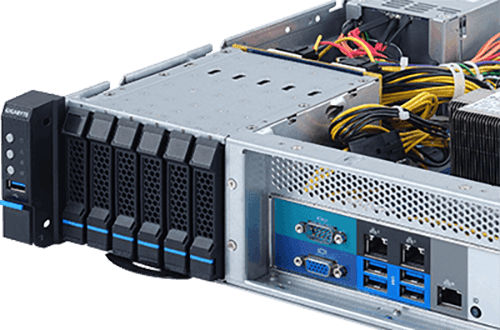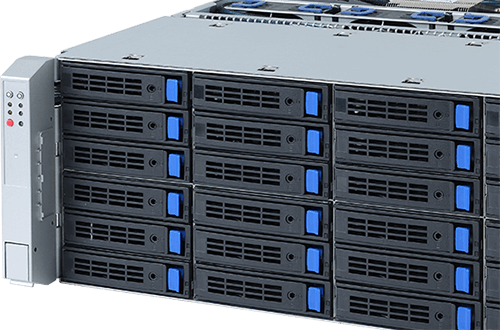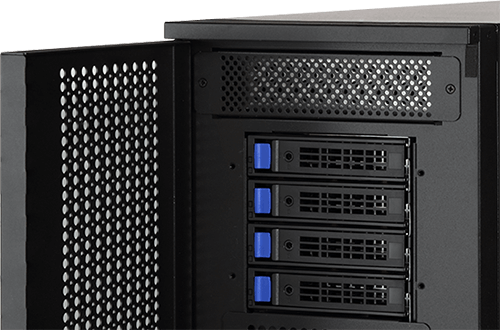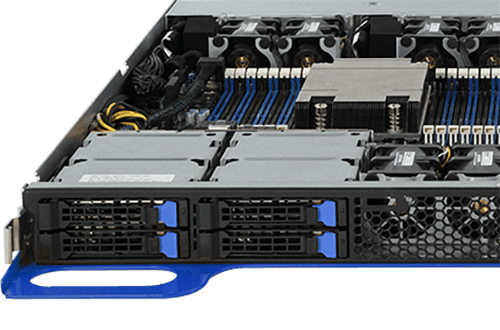
August 10, 2023 ─ Giga Computing, a subsidiary of GIGABYTE and an industry leader in high-performance servers, server motherboards, and workstations, today announced two new GPU servers for the 4th Gen Intel® Xeon® Scalable CPU and NVIDIA HGX™ H100 4- and 8-GPU platforms. With optimal performance and cooling efficiency in mind, the GIGABYTE G363-SR0 excels at both by easily supporting processors and GPUs with high TDP requirements. The second server, the GIGABYTE G593-SD2, targets data centers that prefer air-cooled systems. Both offer the highest GPU compute power possible in a single server of their respective sizes. Additionally, Giga Computing will qualify the new NVIDIA L40S GPU, which is ideal for multi-purpose workloads such as AI, graphics, and video. Also being qualified are new workstation-oriented NVIDIA Ada Generation GPUs: the NVIDIA RTX™ 5000, NVIDIA RTX 4500, and NVIDIA RTX 4000.
G363-SR0: Direct Liquid Cooling
With greater performance comes the need for more novel solutions. The G363-SR0 is purpose-built for direct liquid cooling (DLC) to remove heat efficiently and rapidly from both Intel Xeon processors and the four NVIDIA GPU modules. In a 1:2 CPU-to-GPU ratio, the 3U G363-SR0 delivers ideal compute performance for most AI and HPC workloads. For the incredible amount of high-speed data access required, there are eight 2.5” bays supporting the Gen5 NVMe/SATA/SAS drives. To leverage the best in networking technology, there are six PCIe Gen5 low-profile slots available. And to power the system there is a 2 + 1 redundant power supply configuration using 3000W titanium power supplies.
With exceptional all-around performance, DLC technology was selected for its ability to quickly remove heat from the CPU and four GPUs. Not only does this enable the server to achieve faster performance, it also allows for greater energy savings when compared to a traditional air-cooled system. Data centers in the immediate future will consume an increasing percentage of the world’s electricity, and to offset this trend, alternatives to traditional hot-cold aisle server rooms that exhaust hot air back into the room must be developed. With direct liquid cooling, the heat generated can be transferred to facility water that is then carried out of the data center and rejected via a cooling tower or other such device. The result is a reduction in the associated cooling infrastructure so costs can be reduced, which in turn results in a lower OPEX, TCO and improved ROI.
G593-SD2: 8 GPU System
Because of the great demand for AI training and other compute-heavy workloads, there has been an incredible amount of interest in our G593 series, which is designed for the top tier of GPU-accelerated computing. The 5U chassis is split with the top 1U for the dual Intel Xeon CPUs and bottom 4U for the NVIDIA GPUs. This design ensures that top-of-the-chart performance will not be throttled in a dense chassis, without the need for advanced cooling technologies.
GIGABYTE is always in direct communication with its customers and valued partners, so often makes small adjustments to deliver what the market dictates. In this case, the G593-SD2 was born out of a small but highly preferred change to the form factor of some of the expansion slots in the G593. Preceding this new server was the G593-SD0, with space reserved on the rear top side for low-profile slots. In the new -SD2 model, these slots were removed and fitted with FHHL slots required for NVIDIA BlueField® DPUs. A small change was made to allow the G593-SD2 to take advantage of the multiple BlueField cards to accelerate AI and HPC data movement as well as security isolation. Both G593 servers will deliver the same high degree of computations for generative AI or heavy HPC workloads.
Support for Accelerators
This week, NVIDIA added four new accelerators to its already extensive GPU portfolio for compute or visualization, and Giga Computing will support the new GPUs by qualifying its enterprise solutions. These new GPUs will also be available for purchase in combination with our server platforms.
The NVIDIA L40S GPU, based on the NVIDIA Ada Lovelace architecture, is the most powerful universal GPU for data centers, delivering breakthrough, multi-workload acceleration for inference and training, graphics, and video applications.
The new NVIDIA RTX Ada Generation GPU workstations target different tiers of professional users who need high-performance, real-time ray tracing, AI-accelerated compute, and professional graphics rendering. The Ada-based RTX 5000, RTX 4500, and RTX 4000 GPUs are PCIe Gen4 air-cooled cards that support technologies such as NVIDIA® GPUDirect® for video support and NVIDIA GPUDirect Remote Direct Memory Access (RDMA) for faster and more efficient data transfer to other systems.
Today, Giga Computing has announced new powerful solutions for GPUs and as the year progresses, more servers with GPU baseboard modules will support liquid cooling via a kit included with the company’s servers. In doing so, customers will be able to reduce energy costs and make their data centers greener.
Follow Giga Computing on Twitter: https://twitter.com/GIGABYTEServer
Follow Giga Computing on LinkedIn: https://linkedin.com/company/giga-computing
Follow Giga Computing on Facebook: https://facebook.com/gigabyteserver
Media Contact: Liam Quinn liam.quinn@gigacomputing.com
About Giga Computing
Giga Computing Technology is an industry innovator and leader in the enterprise computing market. Having spun off from GIGABYTE, we maintain hardware expertise in manufacturing and product design, while operating as a standalone business that can drive more investment into core competencies. We offer a complete product portfolio that addresses all workloads from the data center to edge including traditional and emerging workloads in HPC and AI to data analytics, 5G/edge, cloud computing, and more. Our longstanding partnerships with key technology leaders ensure that our new products will be the most advanced and launch with new partner platforms. Our systems embody performance, security, scalability, and sustainability. To find out more, visit https://www.gigacomputing.com/ and join our newsletter.
{{ item.Title }}
{{ item.Desc }}







